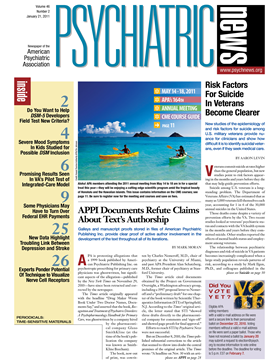The most severe and persistent type of antisocial behavior has its onset in childhood and is usually accompanied by attention-deficit/hyperactivity disorder (ADHD). Such behavior is often a critical path into adult criminality and violence.
Furthermore, the antisocial behavior subtype in which the behavior is severe and persistent has been linked with a variant of the COMT (catechol O-methyl-transferase) gene called the valine/valine variant. Thus it looks as if the variant contributes to the antisocial behavior displayed by youth who have the subtype.
But how might the valine/valine COMT variant lead to antisocial behavior in such youngsters? By impairing social understanding, researchers suggested in a study published in the December 2010 Archives of General Psychiatry.
The lead investigator was Kate Langley, Ph.D., of the Department of Psychological Medicine and Neurology at Cardiff University in Cardiff, Wales.
The study cohort included 4,309 subjects—from a representative population sample of United Kingdom children born in 1991 or 1992. When the children were age 8, they were genotyped and screened for DSM-IV ADHD or conduct disorder with an instrument called the Development and Well-Being Assessment. At that age they were also evaluated for executive control capabilities—for example, the ability to suppress inappropriate responses—with the Test of Everyday Attention for Children Battery and for social understanding—for example, being aware of others' feelings and being aware of the impact of one's behavior on others—with the Skuse Social Cognition Scale. Deficits in the abilities assessed by these tests have been linked with both the valine/valine COMT variant and with severe antisocial behavior.
The researchers first evaluated whether subjects who had ADHD and engaged in antisocial behavior possessed the valine/valine COMT variant significantly more often than the subjects who had ADHD alone or the subjects who engaged in antisocial beahvior but had no ADHD. They found that this was the case and that the strength of the association increased with the frequency and intensity of antisocial behavior.
They also found that the valine/valine COMT variant was significantly associated with impaired executive control and impaired social understanding.
Finally, the researchers assessed whether deficits in executive control and social understanding could explain the link found between the COMT gene variant and antisocial behavior coupled with ADHD. They found that this was not the case for executive control deficits but was true for deficits in social understanding. That is, when executive control dysfunction was considered, the link between the COMT gene variant and antisocial behavior and ADHD remained firm. But when social understanding dysfunction was considered, this link dropped in level of statistical significance.
Thus a deficit in social understanding seems to be a major pathway, but probably not the only one, through which the valine/valine COMT variant leads to antisocial behavior in youth who have ADHD and engage in antisocial behavior, the researchers concluded.
These findings may have important implications for the treatment and prevention of antisocial behaviors in children who both have ADHD and who engage in such behaviors, the researchers noted. For instance, medications used to treat ADHD in such children do not have much of an impact on their antisocial behaviors, but COMT gene inhibitors might. Also, interventions to improve social skills in youth with ADHD who engage in antisocial behavior might help control such behavior.
“The article is part of a series of studies looking at the relationship between a specific variant of the COMT gene and antisocial behavior in children with ADHD,” David Fassler, M.D., a clinical professor of psychiatry at the University of Vermont and a child and adolescent psychiatrist, explained to Psychiatric News. “The findings are consistent with previous reports regarding the existence of such an association. However, the authors further identify impaired social cognition as a potential mediating factor. As a whole, the results underscore the complexity of this emerging field. I would agree with the authors' conclusion that additional studies are necessary to replicate their findings. From a clinical perspective, one would hope that such efforts would ultimately lead to earlier recognition and more individualized treatment for children with ADHD.”
“This study offers evidence that antisocial behavior is at least in part biologically influenced,” Kayla Pope, M.D., J.D., commented. Pope is a clinical research fellow at the National Institute of Mental Health and is APA's member-in-training trustee. “A curious finding [however] was that the COMT variant was significantly related to antisocial behavior only in the presence of ADHD. To better understand this finding, it would have been helpful to have compared children with ADHD only and children with antisocial behavior without ADHD.”
The study was funded by the United Kingdom Medical Research Council, the Wellcome Trust, and the University of Bristol.
